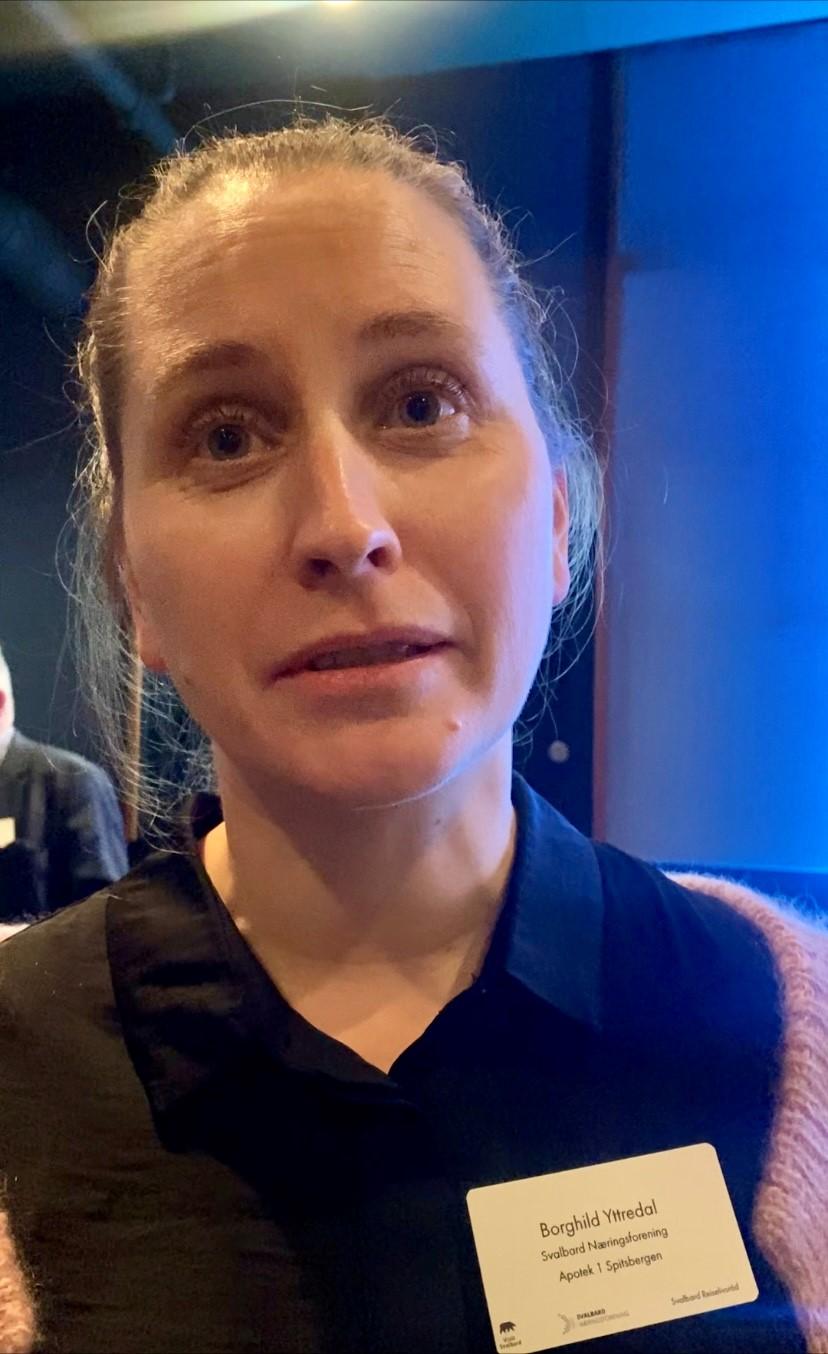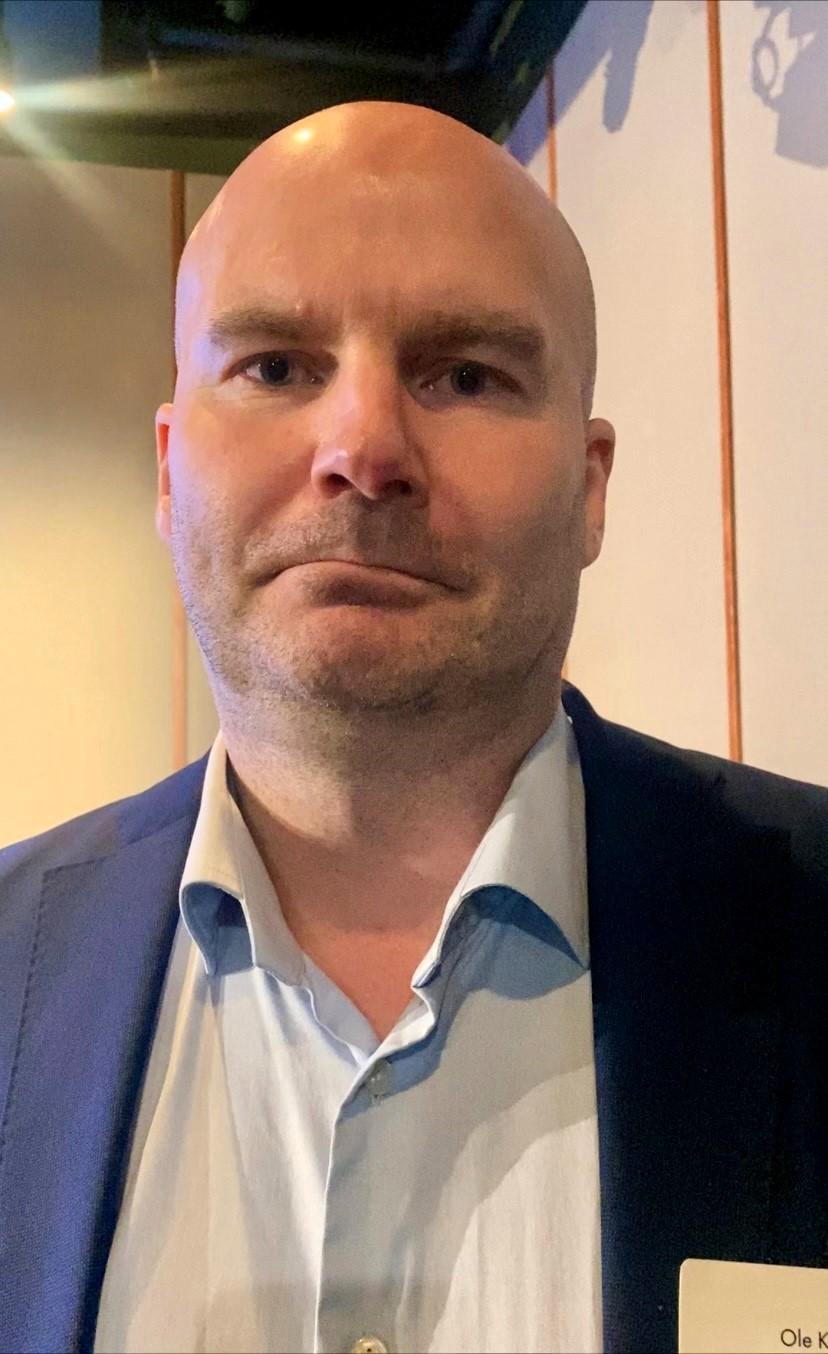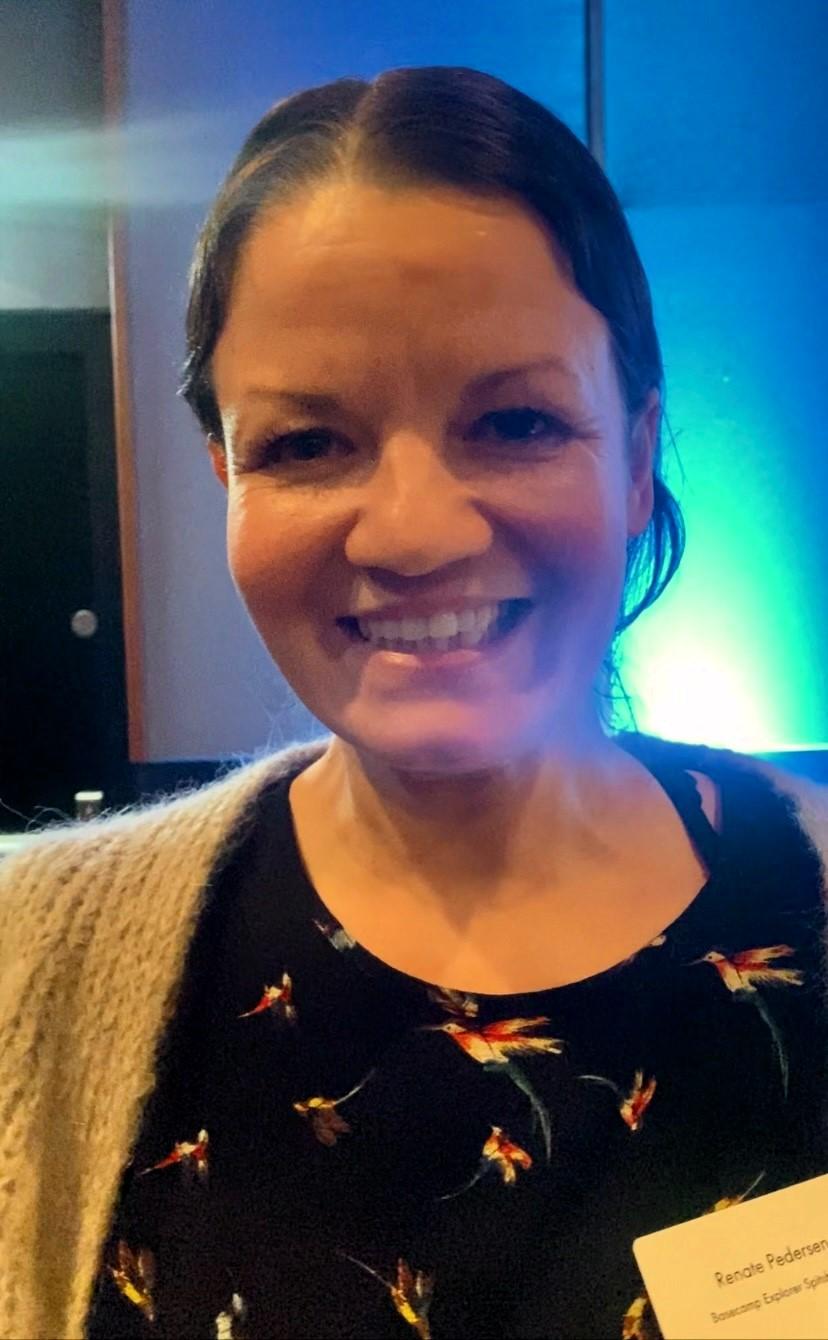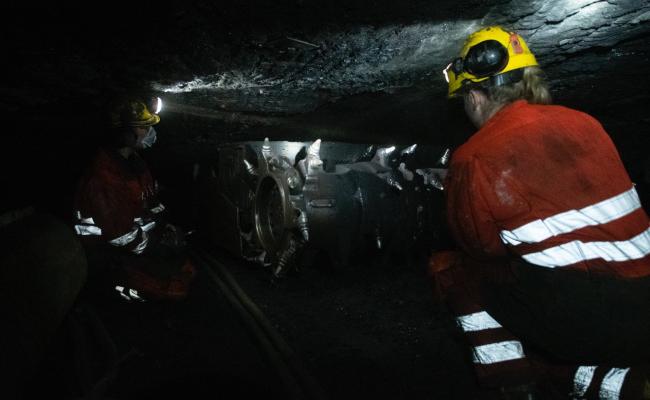Svalbard White Paper: Call for Help From Longyearbyen to the Government: “Decide What You Want With Svalbard!”
The Svalbard Day 2024: The business sector is crucial to the Svalbard policy's success, believes (from the left) Stein Kristiansen in the Norwegian Confederation of Trade Unions in Troms and Finnmark, Sigrid Ina Simonsen in the Confederation of Norwegian Enterprise for the Arctic, Ingeborg Flønes of Hurtigruten Svalbard, and Frank Jakobsen of LNS Spitsbergen. The leader of the debate was Carina Olset Hovda. (Photo: Trine Jonassen)
Oslo (High North News): The same day the Svalbard white paper was concluded, the island's politicians, organizations, and businesses gathered in the Norwegian Capital with clear demands for Norwegian authorities, Predictability, and its inhabitants to be taken seriously. "Trust has been severely weakened," says tourism actor Renate Larsen.
One of the old Norwegian Mountain Codes said to listen to the advice of seasoned mountaineers. This rule apparently does not apply to Norwegian authorities' conduct on Svalbard, either.
"One policy kills another," says Chair of the Longyearbyen Community Council, Terje Aunevik (Liberal).
The Svalbard community as we know it today, with a university, schools, childcare, nightlife, and stores – a family community – is only thirty years young.
Until 1992, Longyearbyen was a company town. A male-dominated mining community where people went to make money.
New white paper
Since then, the Government has presented Svalbard white papers about ten years apart to guide the island's development.
Yet, we were not heard.
The previous Svalbard white paper was presented in 2016 and focused on new jobs, among other things.
However, a new Svalbard white paper is ready already this year to offset the new and tense security policy situation. It was concluded on the same day the Svalbard Day was organized in Oslo for the second time by the Svalbard Business Association (Svalbard Næringsforening), Visit Svalbard, and the Svalbard Tourism Council.
NATO's northernmost point
Svalbard is NATO's northernmost point against a very aggressive neighbor, and Norwegian authorities have clearly stated a desire for a strong, Norwegian settlement on Svalbard. There shall be no doubts about Norwegian sovereignty.
Yet, the island's inhabitants despair. The challenges are lining up, and they are supposedly largely caused by Norwegian authorities.
Norway's final coal mine is shut down for good next year, and 100 jobs will disappear. The differences among people are increasing, and there is not enough housing. Much of the existing housing is in poor shape.
The Svalbard Day 2024 made demands on the politicians. Is the Svalbard policy changing? From left: Anniken Huitfeldt (Ap) who was appointed as Norway's ambassador in Washington this day, Bengt Rune Strifeldt from Finnmark Progress Party, Bård L. Thorheim from the Conservative Party, Torgeir Knag Fylkesnes from The Socialist Left Party and Terje Aunevik in the Longyearbyen local council (Liberal). With debate leader Carina Olset Hovde. (Photo: Trine Jonassen)
Despite the Government's repeated message of Norwegian settlement on Svalbard, some inhabitants feel quite unwelcome.
Carpet bombed
Svalbard had not yet recovered from the pandemic before the Solberg cabinet carpet-bombed the small community with new regulations and resolutions, with short hearing deadlines.
These came, like pearls on a string, in the winter of 2021:
- New regulations regarding security in the field and more on Svalbard, as well as a proposal for new regulations about applying the Package Travel Act on Svalbard.
- Amendments to environmental regulations in Svalbard.
- Change of eligibility rules for elections to the Longyearbyen Community Council.
- New regulations for childcare and education in Longyearbyen.
Not heard
Business actors responded to the hearings as well as they could and delivered what they believed to be "good and thorough hearing responses."
Five overarching Svalbard policy objectives
- A correct and firm enforcement of the sovereignty.
- Correct enforcement of the Svalbard Treaty and control of the compliance of the treaty.
- Protection of peace and stability in the area
- Protection of the area's unique wilderness.
- Maintaining Norwegian communities on the archipelago.
"Yet, we were not heard," says Renate Pedersen from Basecamp Explorer Spitsbergen.
"Tourism has nature as its most important infrastructure. We need nature and want to protect it. Not being listened to regarding the planned environmental regulation is frustrating. We want good solutions, but when we are not listened to, we end up with something worse for people and nature," says Pedersen.
Small important changes
One example is that it is now illegal to approach a polar bear that is less than 500 meters away, even though the polar bear is already well protected. An obligation to retreat is also proposed for those within the 500-meter boundary.
However, polar bears sometimes get close to docked ships and groups of snowmobiles parked while on a trip.
"Is it better for the polar bear that we fire up machines to get away not break the law? Or is it better to sit still until the animal retreats itself?" asks Kristin Devold, Director of the Confederation of Norwegian Enterprise (NHO) Tourism.
Svalbard will not be covered with industries.
Conscious choices
The Director of the NHO, Ole Erik Almlid, agrees with the Government's objective to secure the livability of Svalbard. The next step must be a well-functioning business sector.
"We will not cover Svalbard with industries, but we will be conscious of what we want. The Svalbard white paper must cover this, and the typical silo mentality in Norwegian communities must be set aside. The Svalbard community are keenly aware of opposites being pitted against each other," notes Almlid.
"Yes, protection is important, but one cannot be pitted against the other."
Not understood
Tourism Director Devold questions wether those who write the Svalbard white paper have understood how difficult and fragile it is to operate businesses on Svalbard.
"We must have a white paper that makes it possible to have an active business sector on Svalbard. If not, the sovereignty is actually in danger, as it creates openings for others to establish themselves. We must not be naive! It has never been this important to secure Norwegian jobs on Svalbard as it is now," says Devold.
She expects the Svalbard white paper to address what is allowed on Svalbard.
"The inhabitants want to be part of the experiences. If you are not allowed to do anything, the willingness to live on Svalbard will decrease significantly," notes Kristin Devold.
She also expects the white paper to clearly state the importance of Norwegian jobs in relation to sovereignty.
"There cannot be any doubt," believes Devold and says that Svalbard tourism wants serious operations but risks that regulations become so rigid that it will not be possible to operate.
Worn-down trust
Borghild Yttredal in the Svalbard Business Association says it has become nearly impossible to deal with all the changes from various ministries and directories. She runs a pharmacy in Longyearbyen and is about to lose all confidence that the Government actually wants her there.
The climate between business actors in Svalbard and Norwegian authorities is bad. The trust has been worn down.
"We must build trust, have good communication, and more transparency surrounding the processes. Right now, it is like blindly driving a car. I do not know the overarching plan for the business sector, and I do not know what to do," says Yttredal.
Given the recent situation, she is not even sure if the business sector is wanted in Longyearbyen.
"But the politicians and the state have the opportunity to provide us with predictability. The hope is that help will come in the Svalbard white paper. I must believe in that."
The right to vote in Longyearbyen
The Government has introduced a requirement of three years' residence in a Norwegian municipality for non-Norwegian citizens to have the right to vote and be eligible for election to the Longyearbyen Community Council. They previously gained the right to vote after three years of residence in Longyearbyen.
Calls for political responsibility
The leader of NHO Arctic, Sigrid Ina Simonsen, is very critical of the plans and decisions by various ministries and groups regarding Svalbard, where "one policy kills another."
"These hearings, environmental decisions, and rule amendments are difficult to understand. It makes it difficult to listen to the hearings and understand the objectives of the decisions. We are calling for this clarity in the Svalbard white paper. We also call for political responsibility, which shows these proposals' origin. The business sector in Svalbard cannot handle all these hearings".
Simonsen says Norwegian authorities do not fully understand the chaos they have caused the Svalbard community.
"We have to go to Oslo for them to listen in their own language. One cannot just initiate a rehabilitation process in Longyearbyen. The framework in Svalbard is not the same as in other places. If we are to maintain a community, investment, and political decisions are needed. Politicians do not understand this," says Simonsen.
Good framework
Frank Jakobsen works for Leonhard Nilsen & Sønner AS (LNS) Spitsbergen and says that the business sector is a tool for the state to maintain a solid and sustainable society on the island.
We cannot do this alone.
"But we need good framework conditions, and we hope the Svalbard white paper addresses this."
LNS also need housing for their staff and their families. And living in Longyearbyen is already expensive.
"The state has big visions for Svalbard, but we cannot do this alone. We are well-visited by bureaucrats and other central politicians. They love coming to Svalbard! Then we get to make suggestions, which I sincerely hope will be considered! We must facilitate for people wanting to live with us," Jakobsen concludes.
What Svalbard needs
So what does the local business sector need to succeed in Svalbard, as the Government says they want?
"Enough and proper housing," says Peter Broch in Store Norske Boliger.
He has only lived in Svalbard for five months, and it became clear early on that the property mass was not good enough as it was built for a mining town with a shorter life span, ravaged by climate change.
Important to preparedness
"Secure and stable energy production, ports, housing, and fiber cable" is the message from Ole Kokvik at Kongsberg Satellite Services (KSAT).
KSAT has been on the island since 1997 and wants to stay longer.
"We have developed and have applied for more land to develop services. We need more people, but there is not enough housing," says Kokvik.
A new subsea fiber cable from the Norwegian mainland is now planned, which is extremely important to the preparedness on Svalbard, according to Kokvik.
"What we deliver to the mainland is important to the national preparedness. But now, we end up with the total bill for the cable, which is put on the local population. We need a global infrastructure for which 2600 people do not have to foot the bill," says Kokvik.
More housing
"Energy and fiber before housing," says Terje Aunevik in Longyearbyen Community Council.
To him, it is clear that the local business sector must also cover preparedness when Mine 7 is shut down.
"Housing," says Renate Larsen of Basecamp.
"Because that is where the private tourism sector is last in line."
Hearing proposal for education in Longyearbyen:
For the primary school, the proposal sets a framework for, among other things, how much special education the Longyearbyen Community Council must offer. The Ministry of Education also proposes that the Longyearbyen Community Council should not have an obligation to offer either cultural school, homework help, camp school, or after-school care.
The Longyearbyen Community Council is obliged to offer daycare for at least ten children over the age of three and at least five children under the age of three.
Private actors cannot offer daycare activities.
The new hearing deadline is May 19th, 2024
"Housing!" agrees Frank Jakobsen from LNS.
"We have 25 employees and barely enough housing for them. Some houses are put on the open market, but it seems like the state has an agenda to buy them up themselves. That makes it hard for us to hire more people," says Jakobsen.
Predictability
Ole Kokvik, in KSAT, hopes the Svalbard white paper is clear on what Norway wants with Svalbard.
"When you run the services KSAT do, you need predictability. We need to know what to deal with for the next four to ten years."
The Community Council Chair and Liberal politician Aunevik is a bit surprised at how unresponsive the government has been in the hearing and response period.
"Svalbard tourism is Norway's, if not the world's, best tourism. Yes, it must be regulated, but in the right manner. It surprised me that they were so unresponsive to input. Just the fact that they overturn the Norwegian right to roam the countryside and restrict freedom – they should be a little more careful about that," believes the politician.
He does, however, think that everything will be okay in the end.
Most precarious
Parliament politician and Norway's fresh ambassador in Washington, Anniken Huitfeldt (Labor), participated in parts of the debate. She appreciates the need for a good energy solution and more housing.
"The housing situation is the most precarious in Svalbard, and the security policy focus has changed. Svalbard is NATO in the North. That securing a Norwegian settlement is in Norway's best interest is obvious. And the state must play an active role, also within housing," says Huitfeldt.
She believes that laws and regulations on Svalbard may need their own adaptations.
"We must ensure that regulations are appropriate for Svalbard. Particularly if we want people there."
Not district policy
Huitfeldt still believes that the Parliament trusts the people who live there to know what they are doing.
"The local business sector knows best, but Svalbard is not district policy. It is national policy," says Huitfeldt.
She understands that the trust in politicians is weakened, but believes it is to early to dismiss all politicians.
The new environmental regulations proves we have not listened.
"Politicians sometimes find insufficient solutions for those who live there, but now we need mutual trust and dialogue," believes the Labor politician.
Ignorance
Bengt Rune Strifeldt is a Parliament representative for the Progress Party in Finnmark. He believes it is unfortunate that foreigners have been stripped of their right to vote.
It shows ignorance, believes the politician.
"It is important with dialogue around new environmental regulations. But we must also listen. And the new environmental regulations prove we have not listened. The same applies to the white paper. We risk that the authorities have not listened to those who know where the shoe pinches," says Strifeldt.
"Catch those who break the law instead of further restricting those who do not."
Now he hopes that the Parliament´s Svalbard white paper will show that the politicians have listened to the Svalbard society and that the silo mentality and ministries with different agendas are history.
"The regulations make it difficult not to break the law. We must look more broadly at the Svalbard policy," concludes Strifeldt.








